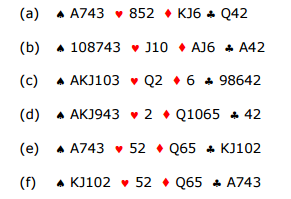Source: http://www.vba.asn.au
Good Points and Bad Points

In discussions between experts, you will hear comments like: “it was a really lousy 12- count” or “that’s the best 6-count I ever held.”
What are they talking about? High-card points don’t tell the whole story.
For example:
– points work better together
– points work better in your (or partner’s) long suits
– aces are more than 4 times better than jacks
– not to mention distribution
And that’s not the end of it. Tens and nines are worth something, but don’t get a look-in on the 4-3-2-1 scale. And if your opponents bid, that adds a whole new set of factors. The difference between a good bidder and a great bidder is the ability to move past the points when evaluating a hand. In fact, if you ever hear someone say: “that’s not a very good 20-count”, then ask them to have a game with you – that person is a star.
In the auction above, let’s say you have 10 points. But is it a “good” 10 or a “bad” 10? Give each of the following 10-counts a rating from 1 (dreadful) to 10 (sensational). Oh, and choose a bid also.

⇓
⇓
⇓
⇓
⇓
⇓
⇓
⇓
⇓
⇓
⇓
⇓
⇓
⇓
⇓

(a) ![]() A 7 4 3
A 7 4 3 ![]() 8 5 2
8 5 2 ![]() K J 6
K J 6 ![]() Q 4 2
Q 4 2
2. Dead-flat shape is a minus. Now look at the minors. Partner is likely 4-5 in the majors, and therefore has 4 minor suit cards. Suppose partner has ![]() xx: your
xx: your ![]() Q is worthless. Similarly, the
Q is worthless. Similarly, the ![]() KJx are not great cards opposite a shortage. Downgrading secondary honours opposite a shortage is a crucial aspect of hand evaluation. Pass.
KJx are not great cards opposite a shortage. Downgrading secondary honours opposite a shortage is a crucial aspect of hand evaluation. Pass.
(b) ![]() 108743
108743 ![]() J10
J10 ![]() AJ6
AJ6 ![]() A42
A42
7. The aces are nice. And the ![]() J10 might help bring in partner’s hearts. The 5th spade is a bonus. Invite game with 3
J10 might help bring in partner’s hearts. The 5th spade is a bonus. Invite game with 3![]() .
.
(c) ![]() AKJ103
AKJ103 ![]() Q2
Q2 ![]() 6
6 ![]() 98642
98642
9. ![]() Qx is pure gold, as is the diamond singleton. And the spades are none too shabby. Bid 4
Qx is pure gold, as is the diamond singleton. And the spades are none too shabby. Bid 4![]() . It’s possible to even have a slam.
. It’s possible to even have a slam.
(d) ![]() AKJ943
AKJ943 ![]() 2
2 ![]() Q1065
Q1065 ![]() 42
42
8. This hand is not quite as good as (c), but the 6-card spade suit is very powerful. 4![]() might not make if partner has an unsuitable hand, but bidding less would be conservative.
might not make if partner has an unsuitable hand, but bidding less would be conservative.
(e) ![]() A743
A743 ![]() 52
52 ![]() Q65
Q65 ![]() KJ102
KJ102
4. This is not a great 10-count. The ![]() Q must be devalued, and the clubs may or may not be useful. The lack of spots in the spade suit means you might not be able to successfully ruff the heart suit good. Pass.
Q must be devalued, and the clubs may or may not be useful. The lack of spots in the spade suit means you might not be able to successfully ruff the heart suit good. Pass.
(f) ![]() KJ102
KJ102 ![]() 52
52 ![]() Q65
Q65 ![]() A743
A743
6. This is hand (e), re-arranged. Now you have good interior spades, very suitable for ruffing hearts. And the ![]() A is a certain winner. This hand is worth a 3
A is a certain winner. This hand is worth a 3![]() invitation.
invitation.
Understanding the difference between hands (e) and (f) is probably the single biggest key to improving your bidding at bridge.
Esta entrada también está disponible en: Spanish

